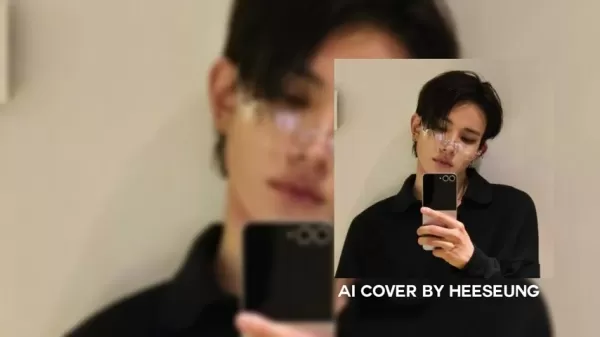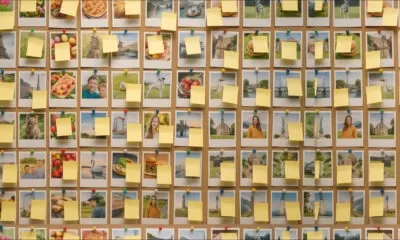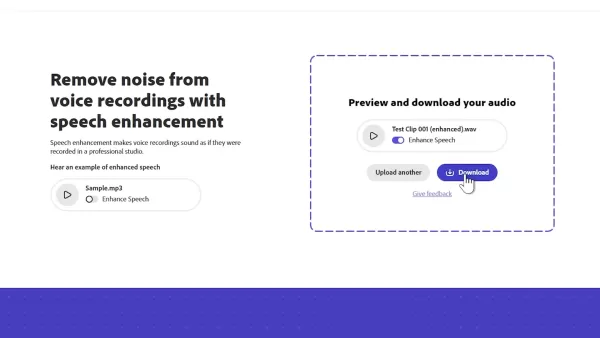Heeseung's AI-Powered 'Wildflower' Cover: A New Era of Music Creation
The digital world is rapidly transforming, introducing groundbreaking ways to express creativity. AI-generated covers have emerged as a unique medium, enabling artists and fans to reimagine beloved tracks. Heeseung’s AI-crafted version of 'Wildflower' has garnered widespread acclaim. This analysis explores the nuances of this cover, its lyrical resonance, and the rising influence of AI in music production.
Highlights
Heeseung’s AI rendition of 'Wildflower' offers a bold reinterpretation of the original.
Its lyrics evoke powerful themes of perseverance and personal growth.
AI-driven music production is reaching new heights of sophistication.
This cover ignites discussions on AI’s role in creative artistry.
Strong fan support and community engagement fuel its popularity.
Discovering Heeseung's 'Wildflower' AI Cover
Origins of an AI Cover
An AI cover is a digitally produced version of a song where the original vocals are replaced with a synthesized voice tailored to mimic a specific artist. Here, Heeseung’s vocal profile serves as the template for 'Wildflower.' Advanced algorithms analyze his vocal traits—tone, pitch, and delivery—and apply them to the song’s melody and lyrics.
The result is a track that feels as though Heeseung is performing 'Wildflower,' despite being entirely AI-generated. This technology unlocks exciting possibilities for artists and listeners, enabling innovative reinterpretations of music. It highlights AI’s growing role in reshaping the music and entertainment landscape.
Lyrical Resonance: Decoding 'Wildflower'
'Wildflower' delivers emotionally charged lyrics centered on love, loss, and the journey forward. The opening line, **'Things fall apart and time breaks your heart,'**

sets a melancholic tone. The lyrics convey regret and vulnerability, with the narrator reflecting on their absence during a loved one’s hardship: **'I wasn't there, but I know.'** This establishes a narrative of navigating complex relationships and the pain of parting.
As the song progresses, it recalls a past relationship’s highs and lows: **'She was your girl, you showed her the world.'** It portrays a time of joy and discovery, followed by a gradual drift: **'You fell out of love and you both let go.'** The vivid image of someone crying on the narrator’s shoulder captures the breakup’s emotional weight, with the narrator offering solace: **'She was cryin' on my shoulder, all I could do was hold her.'**
The lyrics shift to introspection, with the narrator acknowledging lingering thoughts of their past love: **'But I see her in the back of my mind all the time.'** They recognize enduring affection: **'Now I know that you love me, you don’t need to remind me,'** and express a desire to move forward: **'Wanna put it all behind me.'**
The 'wildflower' metaphor emerges as a symbol of resilience and beauty in adversity. The song peaks with a powerful declaration of lasting impact: **'Feels like a fever, like I’m burnin’ alive, like a sign.'** It questions boundaries—**'Did I cross the line?'**—while affirming that some connections remain unforgettable, embracing the relationship’s lasting value.
The Appeal of AI-Generated Vocals
AI vocals have surged in popularity for their ability to replicate familiar artists’ sounds. Key factors driving this trend include:
- Innovation and Originality: AI vocals reframe familiar songs, sparking curiosity with fresh interpretations.
- Accessibility and Flexibility: AI empowers anyone to experiment with vocal styles, making music creation widely accessible.
- Fan Connection: AI covers deepen fan engagement by simulating artists performing diverse tracks.
- Technical Progress: Advancements in AI produce vocals that are often indistinguishable from human performances.
- Creative Experimentation: Artists leverage AI to explore new sonic possibilities, pushing musical boundaries.
Heeseung’s Vocal Signature: Crafting an AI Identity
A successful AI cover hinges on selecting a voice model that captures an artist’s essence. For 'Wildflower,' Heeseung’s voice was chosen for its distinct qualities, ensuring the performance resonates authentically with listeners.
Heeseung’s vocal traits make him ideal for AI replication:
- Unique Tone: His recognizable voice stands out, enhancing listener familiarity.
- Versatility: His ability to adapt across genres suits diverse musical styles.
- Emotional Depth: His nuanced delivery conveys a wide range of emotions, adding authenticity.
- Technical Skill: Mastery of vocal techniques like pitch and articulation ensures precision.
- Expressive Delivery: His engaging style captivates listeners, amplifying the song’s impact.
AI Music’s Wider Implications
Ethical Considerations in AI Music
The rise of AI in music introduces complex ethical questions:
- Copyright Concerns: AI covers risk violating copyrights of original songs and artists’ voices, requiring clear licensing frameworks.
- Artistic Integrity: Critics argue AI music may lack the emotional depth of human creations, questioning its artistic value.
- Job Impacts: AI vocals could reduce opportunities for human singers, necessitating protections for artists.
- Voice Rights: Unauthorized use of an artist’s voice raises concerns about personal and professional identity.
- Misinformation Risks: AI-generated music could be misused to create deceptive content, requiring safeguards.
AI as a Creative Ally
As AI evolves, it may become a vital creative partner, aiding in composition, arrangement, and vocal production. This collaboration could blend AI’s technical precision with human artistry.
Adapting to this shift requires:
- Embracing AI Tools: Artists should view AI as a creative enhancer, not a replacement.
- Learning New Skills: Musicians must master AI technologies to stay competitive.
- Setting Ethical Standards: Industry collaboration is needed to establish responsible AI use.
- Promoting Collaboration: Combining human and AI strengths can yield innovative music.
- Safeguarding Creativity: AI should amplify, not overshadow, human artistry.
Pros and Cons of AI Cover Songs
Pros
Delivers fresh takes on familiar tracks.
Makes music creation accessible to non-professionals.
Strengthens fan-artist connections through unique renditions.
Enables bold experimentation in music production.
Offers engaging, novel entertainment for audiences.
Cons
Poses risks of copyright violations.
May undermine the authenticity of human artistry.
Could reduce opportunities for professional singers.
Raises concerns about artists’ voice ownership.
May enable deceptive or misleading content.
Frequently Asked Questions
What is an AI cover song?
An AI cover song replaces a track’s original vocals with a synthesized voice modeled after a specific artist, using AI to create a convincing performance.
How are AI cover songs produced?
AI algorithms analyze an artist’s vocal traits—tone, pitch, and style—then apply them to a song’s melody and lyrics, adjusting for rhythm and phrasing to create a lifelike rendition.
Are AI cover songs legal?
Legality varies by jurisdiction, use case, and artist consent. Unauthorized covers may infringe on song or voice copyrights, complicating their legal status.
What ethical issues surround AI cover songs?
Concerns include copyright risks, authenticity debates, potential job losses for singers, voice ownership disputes, and the misuse of AI for deceptive purposes.
How will AI shape music’s future?
AI could enhance music creation by aiding composition and production, democratizing access, and enabling innovative experiences, but ethical guidelines are crucial for its integration.
Related Questions
Can AI fully replace human musicians?
AI excels at technical tasks but lacks the emotional depth and originality of human artists. It’s more likely to serve as a collaborative tool than a full replacement.
What benefits does AI bring to music?
AI streamlines production, inspires new ideas, personalizes recommendations, preserves musical archives, and creates immersive experiences for listeners.
How can artists protect their voices and copyrights?
Artists should register their work, monitor unauthorized uses, seek legal advice for infringements, and advocate for clear AI regulations to safeguard their rights.
What skills will musicians need in the future?
Musicians will need traditional creativity alongside AI expertise, data analysis, digital marketing, and community-building skills to thrive in an evolving industry.
How does AI impact artist-fan relationships?
AI can strengthen bonds through personalized content but risks eroding trust if misused. Transparency and ethical AI use are vital for maintaining positive connections.
Related article
 AI Annotation Challenges: The Myth of Automated Labeling
Machine learning research often assumes AI can enhance dataset annotations, especially image captions for vision-language models (VLMs), to cut costs and reduce human supervision burdens.This echoes t
AI Annotation Challenges: The Myth of Automated Labeling
Machine learning research often assumes AI can enhance dataset annotations, especially image captions for vision-language models (VLMs), to cut costs and reduce human supervision burdens.This echoes t
 AI-Powered Tools Boost Voice Clarity for Content Creators
In the digital era, pristine audio is essential for engaging content, whether for podcasts, videos, or professional communication. Conventional methods often fail to deliver, but Artificial Intelligen
AI-Powered Tools Boost Voice Clarity for Content Creators
In the digital era, pristine audio is essential for engaging content, whether for podcasts, videos, or professional communication. Conventional methods often fail to deliver, but Artificial Intelligen
 Tech Giants Empower Educators with AI Training Programs
Technology is revolutionizing education, and leading tech companies are equipping teachers with vital skills. Giants like Microsoft, OpenAI, and Anthropic have partnered with teachers’ unions to estab
Comments (0)
0/200
Tech Giants Empower Educators with AI Training Programs
Technology is revolutionizing education, and leading tech companies are equipping teachers with vital skills. Giants like Microsoft, OpenAI, and Anthropic have partnered with teachers’ unions to estab
Comments (0)
0/200
The digital world is rapidly transforming, introducing groundbreaking ways to express creativity. AI-generated covers have emerged as a unique medium, enabling artists and fans to reimagine beloved tracks. Heeseung’s AI-crafted version of 'Wildflower' has garnered widespread acclaim. This analysis explores the nuances of this cover, its lyrical resonance, and the rising influence of AI in music production.
Highlights
Heeseung’s AI rendition of 'Wildflower' offers a bold reinterpretation of the original.
Its lyrics evoke powerful themes of perseverance and personal growth.
AI-driven music production is reaching new heights of sophistication.
This cover ignites discussions on AI’s role in creative artistry.
Strong fan support and community engagement fuel its popularity.
Discovering Heeseung's 'Wildflower' AI Cover
Origins of an AI Cover
An AI cover is a digitally produced version of a song where the original vocals are replaced with a synthesized voice tailored to mimic a specific artist. Here, Heeseung’s vocal profile serves as the template for 'Wildflower.' Advanced algorithms analyze his vocal traits—tone, pitch, and delivery—and apply them to the song’s melody and lyrics.
The result is a track that feels as though Heeseung is performing 'Wildflower,' despite being entirely AI-generated. This technology unlocks exciting possibilities for artists and listeners, enabling innovative reinterpretations of music. It highlights AI’s growing role in reshaping the music and entertainment landscape.
Lyrical Resonance: Decoding 'Wildflower'
'Wildflower' delivers emotionally charged lyrics centered on love, loss, and the journey forward. The opening line, **'Things fall apart and time breaks your heart,'**

sets a melancholic tone. The lyrics convey regret and vulnerability, with the narrator reflecting on their absence during a loved one’s hardship: **'I wasn't there, but I know.'** This establishes a narrative of navigating complex relationships and the pain of parting.
As the song progresses, it recalls a past relationship’s highs and lows: **'She was your girl, you showed her the world.'** It portrays a time of joy and discovery, followed by a gradual drift: **'You fell out of love and you both let go.'** The vivid image of someone crying on the narrator’s shoulder captures the breakup’s emotional weight, with the narrator offering solace: **'She was cryin' on my shoulder, all I could do was hold her.'**
The lyrics shift to introspection, with the narrator acknowledging lingering thoughts of their past love: **'But I see her in the back of my mind all the time.'** They recognize enduring affection: **'Now I know that you love me, you don’t need to remind me,'** and express a desire to move forward: **'Wanna put it all behind me.'**
The 'wildflower' metaphor emerges as a symbol of resilience and beauty in adversity. The song peaks with a powerful declaration of lasting impact: **'Feels like a fever, like I’m burnin’ alive, like a sign.'** It questions boundaries—**'Did I cross the line?'**—while affirming that some connections remain unforgettable, embracing the relationship’s lasting value.
The Appeal of AI-Generated Vocals
AI vocals have surged in popularity for their ability to replicate familiar artists’ sounds. Key factors driving this trend include:
- Innovation and Originality: AI vocals reframe familiar songs, sparking curiosity with fresh interpretations.
- Accessibility and Flexibility: AI empowers anyone to experiment with vocal styles, making music creation widely accessible.
- Fan Connection: AI covers deepen fan engagement by simulating artists performing diverse tracks.
- Technical Progress: Advancements in AI produce vocals that are often indistinguishable from human performances.
- Creative Experimentation: Artists leverage AI to explore new sonic possibilities, pushing musical boundaries.
Heeseung’s Vocal Signature: Crafting an AI Identity
A successful AI cover hinges on selecting a voice model that captures an artist’s essence. For 'Wildflower,' Heeseung’s voice was chosen for its distinct qualities, ensuring the performance resonates authentically with listeners.
Heeseung’s vocal traits make him ideal for AI replication:
- Unique Tone: His recognizable voice stands out, enhancing listener familiarity.
- Versatility: His ability to adapt across genres suits diverse musical styles.
- Emotional Depth: His nuanced delivery conveys a wide range of emotions, adding authenticity.
- Technical Skill: Mastery of vocal techniques like pitch and articulation ensures precision.
- Expressive Delivery: His engaging style captivates listeners, amplifying the song’s impact.
AI Music’s Wider Implications
Ethical Considerations in AI Music
The rise of AI in music introduces complex ethical questions:
- Copyright Concerns: AI covers risk violating copyrights of original songs and artists’ voices, requiring clear licensing frameworks.
- Artistic Integrity: Critics argue AI music may lack the emotional depth of human creations, questioning its artistic value.
- Job Impacts: AI vocals could reduce opportunities for human singers, necessitating protections for artists.
- Voice Rights: Unauthorized use of an artist’s voice raises concerns about personal and professional identity.
- Misinformation Risks: AI-generated music could be misused to create deceptive content, requiring safeguards.
AI as a Creative Ally
As AI evolves, it may become a vital creative partner, aiding in composition, arrangement, and vocal production. This collaboration could blend AI’s technical precision with human artistry.
Adapting to this shift requires:
- Embracing AI Tools: Artists should view AI as a creative enhancer, not a replacement.
- Learning New Skills: Musicians must master AI technologies to stay competitive.
- Setting Ethical Standards: Industry collaboration is needed to establish responsible AI use.
- Promoting Collaboration: Combining human and AI strengths can yield innovative music.
- Safeguarding Creativity: AI should amplify, not overshadow, human artistry.
Pros and Cons of AI Cover Songs
Pros
Delivers fresh takes on familiar tracks.
Makes music creation accessible to non-professionals.
Strengthens fan-artist connections through unique renditions.
Enables bold experimentation in music production.
Offers engaging, novel entertainment for audiences.
Cons
Poses risks of copyright violations.
May undermine the authenticity of human artistry.
Could reduce opportunities for professional singers.
Raises concerns about artists’ voice ownership.
May enable deceptive or misleading content.
Frequently Asked Questions
What is an AI cover song?
An AI cover song replaces a track’s original vocals with a synthesized voice modeled after a specific artist, using AI to create a convincing performance.
How are AI cover songs produced?
AI algorithms analyze an artist’s vocal traits—tone, pitch, and style—then apply them to a song’s melody and lyrics, adjusting for rhythm and phrasing to create a lifelike rendition.
Are AI cover songs legal?
Legality varies by jurisdiction, use case, and artist consent. Unauthorized covers may infringe on song or voice copyrights, complicating their legal status.
What ethical issues surround AI cover songs?
Concerns include copyright risks, authenticity debates, potential job losses for singers, voice ownership disputes, and the misuse of AI for deceptive purposes.
How will AI shape music’s future?
AI could enhance music creation by aiding composition and production, democratizing access, and enabling innovative experiences, but ethical guidelines are crucial for its integration.
Related Questions
Can AI fully replace human musicians?
AI excels at technical tasks but lacks the emotional depth and originality of human artists. It’s more likely to serve as a collaborative tool than a full replacement.
What benefits does AI bring to music?
AI streamlines production, inspires new ideas, personalizes recommendations, preserves musical archives, and creates immersive experiences for listeners.
How can artists protect their voices and copyrights?
Artists should register their work, monitor unauthorized uses, seek legal advice for infringements, and advocate for clear AI regulations to safeguard their rights.
What skills will musicians need in the future?
Musicians will need traditional creativity alongside AI expertise, data analysis, digital marketing, and community-building skills to thrive in an evolving industry.
How does AI impact artist-fan relationships?
AI can strengthen bonds through personalized content but risks eroding trust if misused. Transparency and ethical AI use are vital for maintaining positive connections.
 AI Annotation Challenges: The Myth of Automated Labeling
Machine learning research often assumes AI can enhance dataset annotations, especially image captions for vision-language models (VLMs), to cut costs and reduce human supervision burdens.This echoes t
AI Annotation Challenges: The Myth of Automated Labeling
Machine learning research often assumes AI can enhance dataset annotations, especially image captions for vision-language models (VLMs), to cut costs and reduce human supervision burdens.This echoes t
 AI-Powered Tools Boost Voice Clarity for Content Creators
In the digital era, pristine audio is essential for engaging content, whether for podcasts, videos, or professional communication. Conventional methods often fail to deliver, but Artificial Intelligen
AI-Powered Tools Boost Voice Clarity for Content Creators
In the digital era, pristine audio is essential for engaging content, whether for podcasts, videos, or professional communication. Conventional methods often fail to deliver, but Artificial Intelligen





























